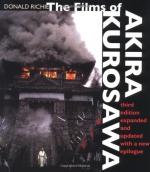|
This section contains 1,441 words (approx. 5 pages at 300 words per page) |

|
Few [directors] have succeeded in reflecting a world-view which encompasses an entire society, an achievement that writers like Fielding and Tolstoy managed so well for the novel. The films of Akira Kurosawa have been seriously ignored by critics who favor more simplistically avant-garde directors like Fellini, Godard, Antonioni and Resnais. Even Luis Bunuel has called Kurosawa's work "superficial." Yet in the contemporary film only Kurosawa, in the tradition of Eisenstein and Pudovkin, has treated the epic as a dynamic, modern form. The epic appropriate to our time, as Brecht defines it, is a work centered around a human being who "is alterable and able to alter," whose thought has been determined by social being, and which appeals to the spectator only to "arouse his capacity for action" and "force him to take decisions" by "facing something." Kurosawa's conception of the epic comes close to Brecht's.
If Kurosawa's films...
|
This section contains 1,441 words (approx. 5 pages at 300 words per page) |

|


